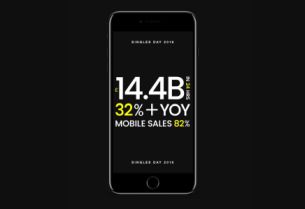November 11th marked the world’s biggest shopping event – Singles' Day or Double Eleven, as it is also known. Founded by Alibaba, the Chinese eCommerce giant, in 2009, Singles' Day is a 24-hour shopathon that dwarfs both Black Friday and Cyber Monday. It has grown to become the largest shopping day in the world, with all e-commerce conglomerates including Alibaba, JD, Amazon, Suning and even brick-and-mortar shopping malls taking part.
This year’s Double Eleven shopping event on Alibaba’s Tmall platform marked another record in China’s e-commerce industry with sales of 14.4BN in GBP, a YOY growth of 32% . The financial results speak volumes about the growth of digital and the evolution of ecommerce.
Increasingly, the event has become an indicator of changes in consumers shopping habits, with new growth drivers being identified as rooted in the event itself. From the expansion of consumer touch points, the renewal of commerce content, the delivery of cross border shopping, to improved technical infrastructure, Double Eleven has proven that it impacts on more than the financial targets of retailers in China.
Alibaba Double Eleven past performance and 2016 sales

Here’s five areas where global marketers could learn from Double Eleven.
1. The importance of mobile & touch point expansion
Double Eleven has capitalised on the expansion of touch points available to brands as a result of the digital revolution. From connecting online to offline and providing cross screen opportunities to purchase, Double Eleven has made significant inroads in connecting the PC / Tablet / Mobile and most recently the TV experience. Notably, this year, 82% of the orders were placed through mobile phones. Consumers also enjoyed consistent service both online and offline and orders placed online could be picked up at the store’s offline stores.
2. The need to evolve our creative work
The event has been the forerunner to richer marketing content. Previously brands provided basic incentives (discount offers, coupons and vouchers etc) and this has evolved to the present day, where interactive and gamified campaigns are commonplace. ‘Red Bag Games,’ promotions with cash benefits, are often used as tools to lure shoppers in to interacting with branded content. On November 9th 2016, Tmall offering “red bags” every hour for consumers to redeem and to be used on Double Eleven, as well as using Tmall points to scratch a voucher to earn cash coupons.
This year, more advanced technology tools were utilised for innovative marketing content. Consumers used Buy+, a AR/VR product launched at the beginning of 2016, to enjoy a virtual shopping experience at home. Alibaba prepared 150,000 pieces of VR glass for buyers. In addition, Alibaba also launched an AR interaction game named “Finding the cat in a carnival”.
3. The power of cyber celebrity content + live broadcast
Based on CNNIC data, online broadcast viewers over the day reached 523 million, accounting for an incredible 45.8% of Chinese citizens. More than 60,000 official brand accounts and shops utilised live broadcasts on the Tmall platform to sell their products before and during Double Eleven, with more than 600 international brands using famous celebrities to promote their products.
David Beckham represented Biotherm and participated in a live broadcast show, and other popular celebrities including Li Yifeng, Zhang Yixing and Yang Yang also participated in branded affiliated content during the day. To build even more momentum, Tmall’s competitor JD.com launched a 12-hours Marathon Superstar Live Show, during which its CEO Liu Qiangdong showed his cooking skills through a JD App's live broadcast.
4. The potential of cross-border shopping
Double Eleven paved the way for cross-border shopping in China, with Tmall international launching to enable Chinese consumers to shop for overseas products. The platform also attracted major overseas shopping malls to offer their merchandise to Chinese consumers with Macy’s, Sainsbury’s and Costco offering special deals.
5. The need for solid infrastructure
The massive spike in traffic and increased sales volume over the course of the day requires solid infrastructure. Anticipating this bump encourages brands and businesses to invest in the platform systems, delivery and warehouse logistics, the payment system, and data and IT capability. This year the payment systems and IT capacity were ready to embrace the surge of incoming traffic within the first hour. After Double Eleven launched, sales reached up to 1 billion in the first 52 seconds, reaching 10 billion in 6 minutes and 58 seconds.
These investments help supercharge the ecommerce space for the following year, setting consumer expectations of brand experiences and increasing sales. With more money being spent online in a single day than ever, Chinese brands are seeking innovative ways to break through the noise. But are western brands paying enough attention to the ecommerce blue print being set by the exciting and competitive Chinese market?
















